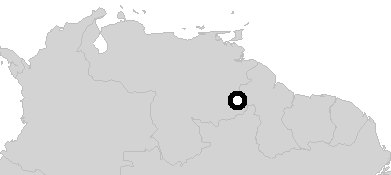
| www.CuriousTaxonomy.net |
|
The Flood in World Myth and Folklore
Northern South America |
| © 2021 Mark Isaak |

Shortly after people arrived on earth, all crops grew on a single tree. The culture hero Makunaima and his four brothers cut down the tree, and water immediately poured from the stump, and with it came fish. One of the brothers made a basket to stop the water, but Makunaima wanted a few more fish for the rivers. When he lifted the basket just a little, water came out full force, flooding the earth. Some people survived in canoes or by climbing tall palms until the water subsided. (In some versions of this myth, the water from the stump merely forms rivers.)
Bierhorst, 1988, 79-80.

There was once a man named Wazamaíme. His mother-in-law told him to dig a hole to catch a tapir. She really wanted to kill him, so she kept telling him to dig it deeper and deeper. Finally he dug so deep that he broke into the sky of the world under this one. A wind blew through carrying him up into our sky.
When the wind took him, he turned into a little bird called Sekéi and circled down to land at the edge of the plantation of the giant armadillo Mauraíme. Mauraíme's daughter was there. Wazamaíme started singing, and the daughter said, "Come, sit on my arm if you will." He sat on her arm, and she made a cage for him and took him to hang by her hammock. Every night she dreamt that he was a beautiful young man. One day she said to the bird, "Turn into a man and marry me." That night he did.
He remained in the house of Mauraíme for three days. One day Wazamaíme's wife wanted to go to the top of Petouitepe, a steep mountain. "How can I climb there", Wazamaíme asked?
"Grasp my hair. I'll take you with me." Then he held her long hair, and they went under the ground and arrived at the summit.
Later Mauraíme told Wazamaíme that he should visit his relatives, who were drinking kaschiri. "But don't speak of me to your relatives, or else they will kill me." Wazamaíme went, promising to return soon.
While he was with his relatives, though, he got drunk on kaschiri and sang, "As a Sekéi bird the wind has taken me. On a leaf of tucuma I settled. With her hair the daughter of Mauraíme has taken me." When they heard this, Wazamaíme's four brothers-in-law by his first wife decided to kill Mauraíme. They went to Mauraíme and killed him, but his daughter escaped. They cooked his body and ate it.
Later, Wazamaíme told his mother, "I am going to sleep. Do not let anything wake me."
The next morning, one of the brothers-in-law who had not helped to kill Mauraíme went fishing on the Apauwau. He saw many, many fish passing upstream by his boat, but none took his lure. That was because while the body of Wazamaíme slept, his shade had asked Rato, the water demon who owned all the fish and aquatic animals, to send his children to help him avenge the death of his father-in-law. He also saw the shade of Wazamaíme boating upstream, but did not recognize him. Wazamaíme sang, "In the depths of the water, I go upstream, painted with genipapo like the fish. Under the ground I go, like a war chief of the fish, to summon the fish. From the body I have gone out, deeply at the bottom of the river I went."
That brother-in-law returned to the house. Wazamaíme's shade went there first, so that Wazamaíme was already awake. Wazamaíme told him to flee to Mt. Peluoi-tepe.
Later Wazamaíme went to the house of the fish and led them to his house. The fish drank much kaschiri outside his house to become brave. Only a little was left for the small fish Aliwai and the crab Mawai. Wazamaíme ordered these two to penetrate below the house and find a way in. The other fish were not sober enough.
Aliwai came into the house first. Wazamaíme's first wife was there. She said, "This is what Wazamaíme told me, that many animals would come." She took the fish and threw it on the fire. When the crab Mawai followed, she did the same with it. Much water went out of the crab and extinguished the fire. More and more water came out, flooding the three houses and going out through the door. Then many fishes entered. They carried the houses, with everyone and everything inside, to the river, and they threw them into a deep place below the cataracts. All the people in the houses were transformed into Mauari, demons. Wazamaíme turned into Moro-podole, the Father of the Fish.
Theodor Koch-Grünberg, Del Roraima al Orinoco, ed. Ernesto Armitano (Caracas, Venezuela: Gráficas Armitano, C.A., 1981), 2: 100-104; original title: Von Roroima Zum Orinoco, 2nd ed. (Stuttgart: Editorial Strecker y Schröder, 1924).
